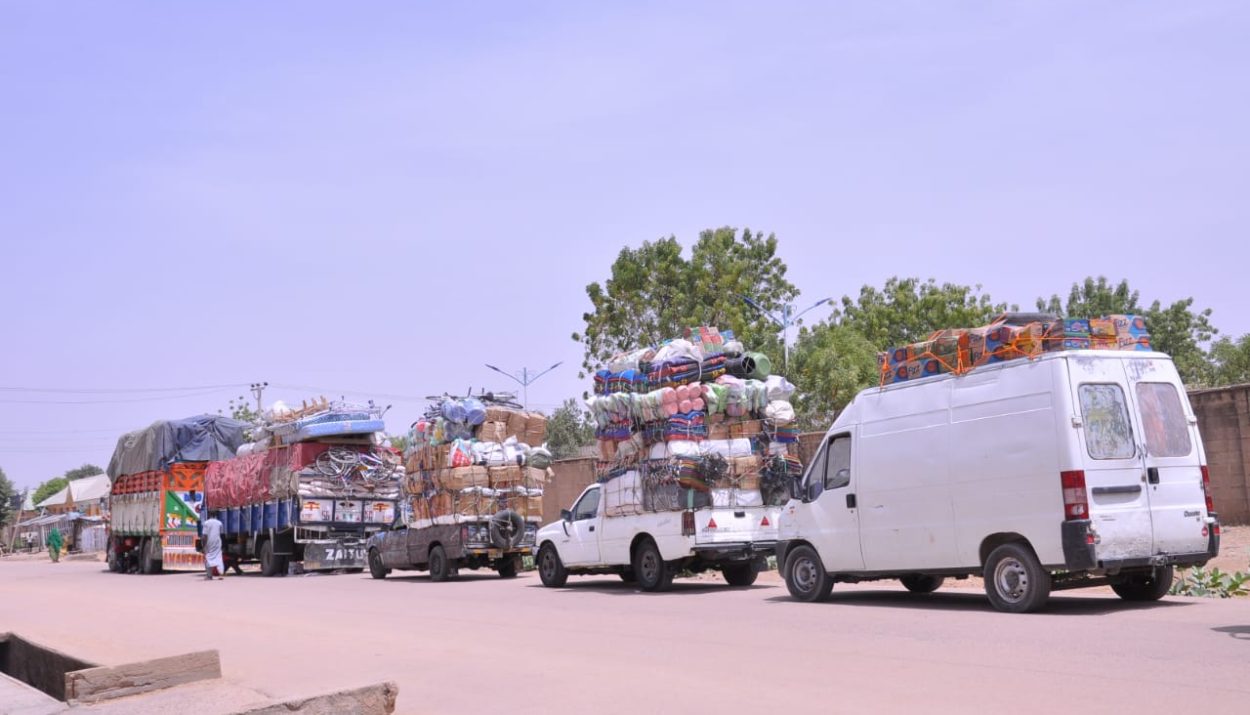In continuation of measures to address the food inflation and cost of living crisis, the Federal Government Tuesday said it had so far intercepted 141 trucks attempting to smuggle grains and other staples to Niger Republic, Chad, Cameroon, and the Central African Republic.
The Comptroller-General of the Nigeria Customs Service, Bashir Adeniyi, said that the service had within two weeks arrested about 120 trucks smuggling food items from Nigeria while the Economic and Financial Crimes Commission stopped 21 food trucks from leaving the country on Tuesday.
As the CG was disclosing the measures being enforced to ensure food security at the House of Representatives in Abuja on Tuesday, truck drivers, who have been targets of attacks by hoodlums, had threatened to declare a strike if the situation persisted.
Several trucks and warehouses, mostly owned by manufacturers and other members of the organised private sector have come under attack from hoodlums as the food inflation and the cost of living crisis in the country spiralled.
Last week, some youths stole food items from trucks stuck in traffic along the Kaduna Road in the Suleja area of Niger State.
On Sunday, hoodlums attacked a warehouse belonging to the Agricultural and Rural Development Secretariat of the Federal Capital Territory Administration located in the Dei-Dei area of the capital city where they looted rice, grains, and other relief items.
The miscreants in their numbers also stormed another warehouse in the Idu Industrial Estate, Jabi, Abuja, but were repelled by the troops guarding the facility.
Similarly, another set of youths attacked trucks conveying building materials and spaghetti in Ogun and Kaduna states on Saturday and Sunday, respectively.
Worried by the unsavoury development, the organised private sector warned the attacks could lead to a shutdown of industries across the country.
Briefing the federal lawmakers on the enforcement of the Presidential directive to curtail food smuggling during the sectoral debate series, the Customs CG, Adeniyi, said President Bola Tinubu had given a directive that the arrested trucks be diverted to the local markets in the area where they were arrested to force down the prices of grains and other food items.
120 food trucks
“We arrested in two weeks about 120 trucks of food items going out of the country. These are the food items Mr President has asked us to give back to the local markets where the arrests were made. We believe this will drive down the price of food items in these places,” he added.
He stated that the decision to halt the smuggling of food items was to fight hunger and not encourage those who wanted to enrich themselves at the expense of the people.
He warned against adopting quick-fix solutions to address the food scarcity in the country, adding that the country must put in place long-term measures to address the situation.
Adeniyi explained that the Customs were playing their part in ensuring that the problem of food security was addressed, adding that currently, most agriculture inputs attract zero duty and the value-added tax.
The CG noted that the need to learn from lessons learnt while auctioning seized food items in Lagos was the reason the service was ha to commence the program outside Lagos State.
About seven persons died in a stampede at the NCS Old Zonal Headquarters in the Yaba area of Lagos State during the auction of bags of rice confiscated from smugglers by the NCS last month.
The incident forced the authorities to suspend the exercise.
Bringing the lawmakers up to speed on the public auction, Adeniyi said President Tinubu directed the NCS to auction to vulnerable Nigerians the food items intercepted at the Nigerian borders, noting that the implementation of the programme kicked off in Lagos, but was stopped.
Adeniyi further said the seized foodstuffs were to be sold to the local markets nationwide on the President’s orders.
He said, “Mr President has directed that we sell directly to needy Nigerians food items produced locally but which were seized. This is one of the ways to address hunger and food scarcity we are facing. We have started this in Lagos.
“Also, the President has also directed that imported food items seized by the Nigeria Customs Service should be sold back to the local markets for resale to Nigerians.”
Fielding questions from lawmakers during the session presided over by Deputy Speaker, Benjamin Kalu, Adeniyi gave reasons why the auction of seized grains was temporarily discontinued by the NCS.
“We started in Lagos but you know what happened. There was a stampede. No matter the number of bags of rice you share or sell, it will not be enough.
“We have to focus on one place at a time. We will use the lessons we learnt in Lagos to coordinate this programme when we resume,” he said.
In their enforcement of the Presidential directive against food smuggling, operatives of the Maiduguri zonal command of the EFCC have arrested 21 trucks loaded with food and non-food items heading towards N’djamena, Chad Republic, Central African Republic, and Cameroon.
The Head of Media and Publicity, EFCC, Dele Oyewale, said in a statement on Tuesday, that the trucks were intercepted in a sting operation at major exit routes along Kalabiri/Gamboru Ngala and Bama Roads, Borno State.
It said, “Investigation showed food items cleverly concealed in the trucks that would have gone undetected but for the eagle-eyed vigilance of operatives of the commission.
Meanwhile, the Minister of Agriculture and Food Security, Abubakar Kyari, on Tuesday said that food scarcity came too early this year, noting that “It often rears its head in May/June but it came quite early this time.’’
This was just as he blamed the food scarcity being experienced across the country on smuggling, flooding, the naira redesign policy and the COVID-19 pandemic which ravaged the world in 2019 and 2020.
Speaking at the sectoral debate series at the House of Representatives on Tuesday, Kyari noted that the naira redesign policy implemented by the government of Muhammadu Buhari denied small-scale farmers access to cash to pay for their harvest towards the end of 2022 as well as pay for cultivation during the commencement of the wet season.
He asserted that the insecurity in the country culminated in low cultivation of land as many farmers were displaced from their communities.
To address the challenges being faced by farmers nationwide, Kyari assured Nigerians that President Tinubu had mandated the agric ministry to make grains available both for cultivation and consumption.
“We have engaged the World Food Programme to help stabilize prices. We also asked them to assist our farmers to produce more food.
“But we want our farmers to take advantage of irrigation facilities to do all-season farming and the President has been very supportive of this,” he said.
The minister noted that so far, “About 5,000 tractors are working in Nigeria,” adding that the nation needs “72,000 functional tractors to meet the growing needs of Nigerians.”
He added that the ministry had signed a Memorandum of Understanding with a manufacturer to supply 2, 000 tractors annually for the next five years.
Driver may strike
In a development that could compound the social and economic situation in the country, truck owners involved in the haulage of food and fuel have declared that they may stop transporting the commodities following the incessant attacks on their vehicles by hoodlums.
The National President of the Nigerian Association of Road Transport Owners, Yusuf Othman, in an interview with The PUNCH on Tuesday, said the truck drivers might withdraw their services if the attacks and looting of food trucks continued.
He called on the state governments to address the looting of trucks, adding that the looted food items were not insured by their owners.
In an interview with The PUNCH on Tuesday, Othman said the recent attacks had severely impacted their operations negatively.
He stated, “We are affected negatively by these attacks and right now we are strategizing. It might interest you to know that the insurance we get does not cover riots or such fracas.
“So, we are appealing to the general public to avoid such attacks on our trucks. This is because if such kind of attacks continue, what will happen is that transporters will stop carrying food items and this will lead to food scarcity across the country.
“If you are transporting food and somebody stops you on the road and loot the food items, what will you do?”
The NARTO president expressed worries about the inadequate security on the roads, stating that the truck owners would stop operations if the attacks on truck drivers did not abate.
“We just have to stop transporting the food items, until something is done about it. Security has to be enforced. The various state governments need to act now to reduce the suffering of their citizens because this is not entirely a Federal Government issue.
“The state governments must be able to curb these concerns because it is usually the local people in states that attack our trucks and cart away food items in these trucks,” Othman stated.
On whether NARTO had commenced any form of discussion with state governments on the issue, Othman replied in the negative, stressing that some of these attackers also targeted fuel tanker drivers.
He, however, stated that the association had met with security agencies over the issue and again pleaded with the public to desist from attacking trucks transporting food and other products.
The transporter said, “As for state governments, we have not met with them because we don’t have direct access to interface with them, but are discussing with some security agencies how best to avoid this kind of incident. It is not good for everyone.
“It can threaten the distribution of food because if you load (goods) and somebody is going to stop you on the road to loot the goods, why will you continue to load? And mind you, it is not only trucks that are transporting food that they attacked.’’
Speaking further on the attacks on tanker drivers, Othman explained, “For the fuel that we load, sometimes when these trucks break down, you will see locals coming to open the tanks by force to scoop the fuel.
“If a fire breaks out during such an instance, people will attribute it to fallen trucks, not knowing that it was the locals who forced the tanks open to scoop fuel.’’
“So, it is high time people realised that as much as we appreciate the situation of the country, they must know that two wrongs can’t make a right. There is the need to address these things holistically so that we get a lasting solution,” he stated.






2 Comments